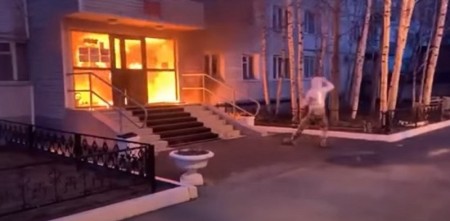From the telegram channel of Solidarity Zone, set up in Russia to support people persecuted for anti-war actions
Igor Paskar is the first to be tried [in Russia] for anti-war arson as a “terrorist”.
On June 14, 2022, Igor painted his face in the colours of the Ukrainian flag and threw a Molotov cocktail at the FSB [federal security service] headquarters in Krasnodar.

The FSB investigator charged him with committing a “terrorist act” (Part 1, Article 205 of the Criminal Code of the Russian Federation).
Paskar is also accused of setting fire to a banner with the letter Z and the inscription “We don’t leave our men behind”, which is qualified as “vandalism” (part 2 of article 214 of the Criminal Code of the Russian Federation).
“It was a public action. If I had disappeared, it would have lost all meaning”, says Paskar, answering the question of why he did not try to escape.
I am not a terrorist warrior who hides. I wanted to express my opinion, it was a cry. I am a simple person, a simple hard worker, like those who live in Ukraine, in the war zone. I sacrificed myself to the regime, but I am not a terrorist. What kind of a terrorist? That’s ridiculous.
Igor faces up to 15 years in prison on the charges.
First, Igor Paskar was sent to the FSB-controlled pre-trial detention centre-5 in Krasnodar — an analogue of the Moscow “Lefortovo”. For all the time Igor was there, not a single letter [of those sent] was handed to him.
On October 26, Igor was transferred to SIZO-1 [detention centre] in Krasnodar, where letters were given to him. And then he was transferred to Rostov-on-Don, where the trial of his case began.
Read the rest of this entry »


 Posted by peoplenature123
Posted by peoplenature123 




